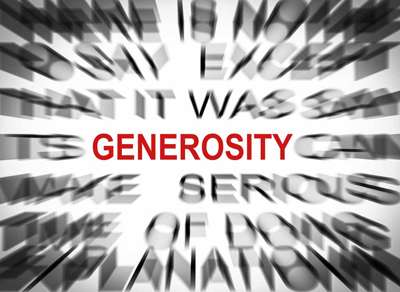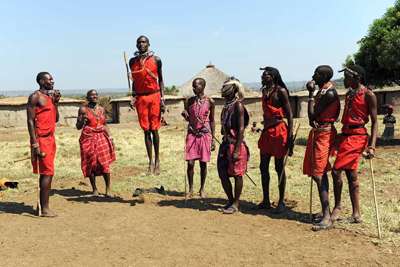Is generosity essential to human existence?

When Dennis ole Sonkoi was a child he never gave much thought to sharing. Growing up in Kenya as part of the Maasai community – a pastoral group of herdsmen that travels throughout Kenya and Tanzania – it was routine to make sure others had resources, like enough milk to drink.
"I never questioned the whole aspect of sharing the resources that we had," says Sonkoi, a Rutgers graduate student in evolutionary anthropology. "If someone had more cows, the family would redistribute the milk so that all the kids in the village would have enough."
Sonkoi is among a team of graduate students at Rutgers and Arizona State University who will spend the next three years trying to gain a better understanding of cooperation and generosity as part of the Human Generosity Project. Their goal is to learn how people from cultures throughout the world pool risk by giving to those in need in order to ensure that if they ever need help someone will be there for them.
"A lot of communities in Africa are being affected by climate change," says Sonkoi. "I think we will draw lessons from this project and see how generosity has helped the Maasai community cope with draught and calamities like disease with a system that makes sure everyone comes out of the hardship and no one is left behind."
The Human Generosity Project recently received a $2 million grant from the John Templeton Foundation, a philanthropic organization that supports scientific, philosophical and theological research which advances human progress on topics ranging from evolution and infinity to forgiveness, love and free will. Researchers will examine systems of sharing across societies through fieldwork, laboratory experiments, computational modeling and education and outreach activities.
They'll look at what's behind the generosity, ask why some humans are more generous than others and try to figure out if generosity is an essential adaptation of the human species.

Lee Cronk, professor in the Department of Anthropology in the School of Arts and Sciences, says the Templeton grant and funding from the National Science Foundation and both universities, will allow research to be conducted at sites in Kenya, Tanzania, Uganda, Fiji, Mongolia and the American Southwest where Arizona, New Mexico and Mexico all meet.
While scientific research has shown that giving your time and money makes you happier, what this project will examine, Cronk says, is the more adaptive behaviors of those who live in cultures where generosity is second nature—a kind of evolutionary payback. Something that money can't buy.
"This project will help us understand what triggers the most effective responses of generosity," says Cronk, a co-director of the project with Arizona State assistant psychology professor Athena Aktipis. "In certain cases, like in the instance of the Sandy Hook elementary school shooting, lots of people sent stuffed animals but that didn't do that much good for the community."
While Americans often look for emotional feedback from their generosity, other hunter-gatherer societies like those that are part of Human Generosity Project understand that the future is unpredictable and know that something bad could happen to them.
"What we may look at as being generous they look at like an insurance policy for the future," Cronk says. "They are not expecting to be repaid, but want to make sure that if something does happen they won't have to worry."
In the United States, this is the philosophy of a dozen ranchers, known as the Malpai Borderland Group who live and work primarily in Southeast Arizona and will be part of the study. A few hundred people living in this close-knit community about 35 miles from the Mexican border work together, neighbor helping neighbor, to protect their way of life and prevent development on tens of thousands of acres. The open-space, however, is vast and the numbers of ranchers needed to work the land are dwindling, Cronk says.
"I thought they would be worried about things like drought," says Cronk. "But they know how to deal with that. They worry about the risk of injury, about who will be there to help them if they get hurt and need someone to do the work on the ranch."
This doesn't surprise Sonkoi whose family still lives in Kenya, a place he plans to return with his wife when he finishes this project.
"I have lived and experienced both lifestyles," says Sonkoi. "And although it is much different here in the United States than in Kenya, the one thing I've observed about generosity is that it is universal. The only thing that seems to be different is how it is applied."
Provided by Rutgers University




















